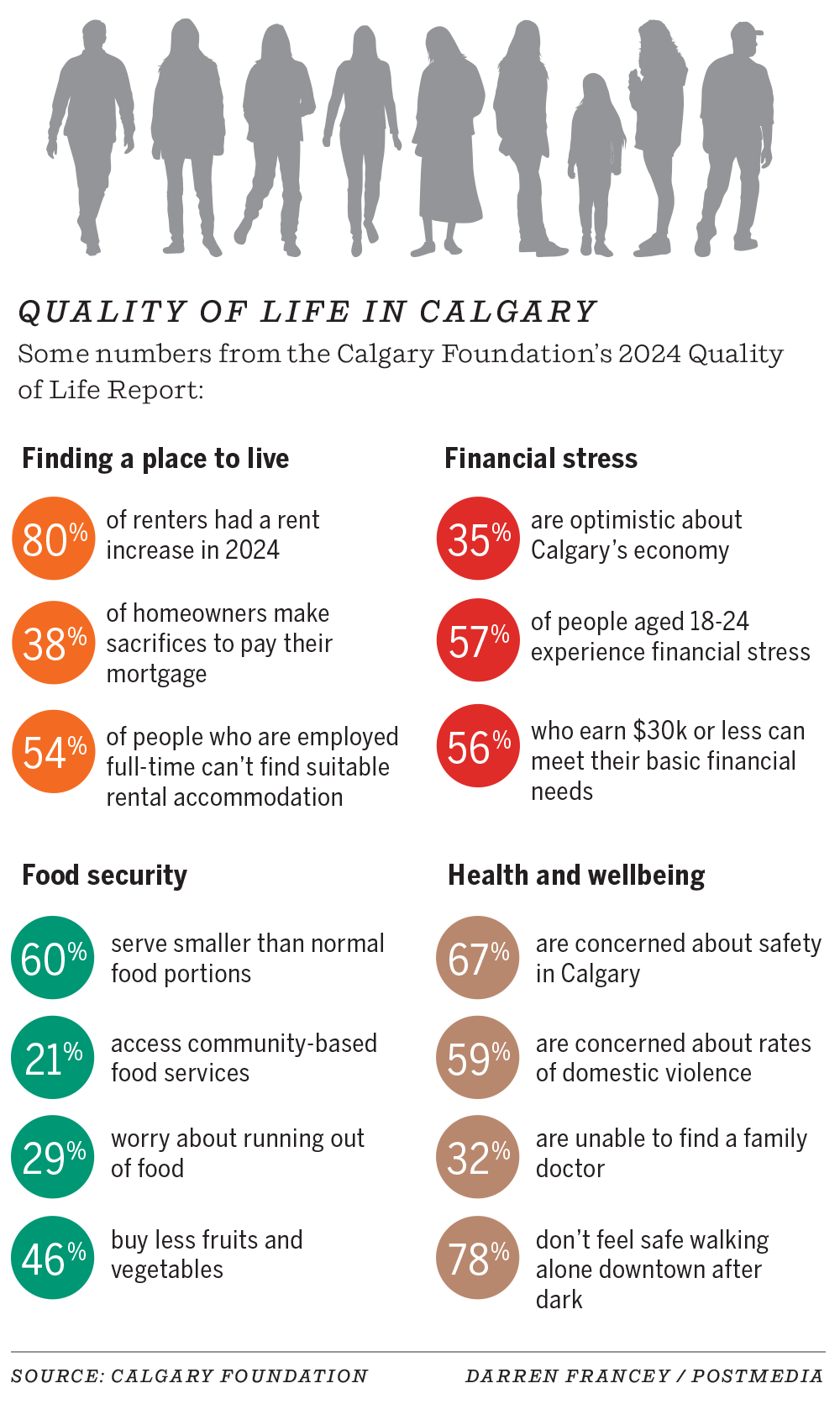‘You’re really seeing the same challenges (as last year), but amplified — affordability continues to be a key issue’

Inflation is easing but economic stressors plaguing Calgarians continue to rise, states an annual quality of life survey.
Cost-of-living pressures are proving persistent for city residents, with just 35 per cent in this year’s survey of 1,000 people conducted for the Calgary Foundation saying they’re optimistic about the local economy, down from 50 per cent in 2023.
The questionnaire from last May and June also found 43 per cent of the population is stressed by financial issues, compared with 33 per cent in 2021.
The figures set a largely sombre tone in what the foundation and social agencies say is a tale of two cities — one of relative comfort, alongside another of quiet desperation and daily trade-offs made to survive a relentless affordability crisis, said Taylor Barrie, spokeswoman for the Calgary Foundation.
“You’re really seeing the same challenges (as last year), but amplified — affordability continues to be a key issue,” said Barrie.
Those issues have taken a toll on larger numbers of people who hadn’t previously known financial instability, she said.
“These challenges are hardest among young people, the Indigenous and newcomers, but it’s become much more of a universal struggle, whether you’re 65 or 35, struggling to make ends meet,” said Barrie.
Affordable housing, food security remain issues
Accordingly, 54 per cent of those employed full-time told the survey they can’t find suitable lodging, up by 14 per cent from 2023, and that 78 per cent had to make spending trade-offs to stay housed, an increase of six per cent.
Chaniece Favell was stranded in Calgary by the pandemic when she was visiting from Winnipeg and struggled to find decent, affordable housing.
After crime and a landlord convinced her to seek another home, she counts herself lucky to have landed a subsidized apartment in Huntington Hills just 11 months after applying.
But other costs have remained a struggle, namely food, said the 33-year-old mother of two young children.
“We’ve used a food bank every three or four months. We’ve had to do things like find a community pantry,” said Favell, adding she’s even entered into trading deals with a friend.
A year ago, she landed a part-time job with the city helping connect people in need with resources, where she’s encountered challenges that are all too familiar.
“It’s choosing between paying a bill and getting food for the week . . . it’s buying fast food, which is what you can afford, though it might not be the best for you,” said Favell.
“I’ve gotten (utility) disconnection notices, so I’ve used the food bank to help pay things off.”
Her experience is consistent with the survey that found that, though inflation has slowed significantly, its toll is still being felt, reflected in a stubbornly high level of food insecurity.
Among respondents, 39 per cent say they skip meals to ensure their children can eat, while 21 per cent have turned to community-based food services.
A month ago, the Calgary Food Bank said it’s now serving 750 people a day, up from 300 in 2019.

‘We’re seeing a lot of fatigue’
With affordability issues moderating in recent months, Meaghon Reid said she was hoping the survey would impart more uplifting news.
“I was hoping it’d be a little bit better but I’m not surprised,” said Reid, executive director of Vibrant Communities Calgary, which advocates on poverty issues.
“We’re seeing a lot of fatigue — the ship is turning around from a macroeconomic standpoint but that hasn’t changed for a lot of people who are still spending too much on food, rent and utilities,” she said.
“I wonder where this will end.”
While rental costs, for the most part, are no longer rising, affordability remains a challenge, particularly for people seeking places with more than two bedrooms, said Reid.
And she was alarmed at a survey finding that shows 67 per cent of respondents gave to charity this year — down from 93 per cent in 2017.
“If people are new to poverty, they’re new to feeling that sense of desperation and they hold onto their money more,” said Reid.
Charities also appear to be suffering from a dramatic drop in volunteering, with 49 per cent of respondents stating they’ve engaged in that work this year, well down from 78 per cent in 2018.
Barrie said it’s likely part of the vicious circle of financial insecurity.
“That’s a big shift there — people spend so much of their time making ends meet,” she said.

Alberta among provides with lowest minimum wage
Living wages along with a higher minimum wage would help bridge some of the gap, as would more affordable housing, said Vibrant Communities Calgary’s Reid.
“We’ve had a lot of housing starts, which is fantastic, but we need to realize them faster at a higher volume,” she said.
The province, she said, must also do more to support charities helping the needy.
“That means the lowest-paid Albertans have had their spending power cut by a shocking 20.57 per cent as multiple economic crises and record-breaking inflation hammered working people in our province,” he said in a statement.
“The minimum wage is not just for teenagers to have some pocket money. There are working mothers, new Canadians and seniors who rely on this wage to support themselves and their families.”
He noted Alberta, along with Saskatchewan, now has the lowest minimum wage in the country at $15 an hour.
The survey has a margin of error of plus or minus 3.1 per cent, 19 times out of 20.

